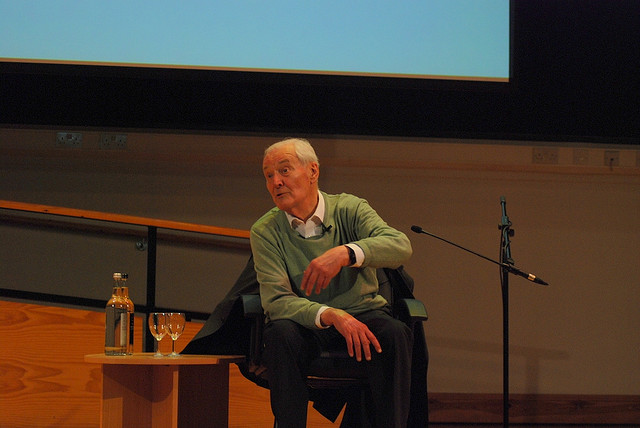The Labour Party has become more pro-European as time has progressed
The Labour Party in the UK has a traditionally complicated relationship with European integration, with the party having difficulty in reconciling itself with the pro-federalist vision that its sister parties have adopted. Dr Dionyssis G. Dimitrakopoulos traces the evolution of Labour’s current position on the issue, and argues that the drift has been towards seeing EU membership as an important element of their policy offer.

Tony Benn – a famous Labour Eurosceptic (Credit: Regent’s University London, CC BY 2.0)
Writing about the British Labour Party’s attitude towards European integration, Donald Sassoon rightly pointed out in his classic history of the West European Left in the 20thCentury, that “No party of the Left has exhibited such profound uncertainty on the question of Europe.”
The British Left’s views on European integration – as expressed through the Labour Party- are quite dissimilar to the traditions of Labour’s French and German sister parties, ie the Parti Socialiste (PS) and the Sozialdemokratische Partei Deutschlands (SPD) respectively.
For example, the Labour Party has never shared the German Social Democrats’ principled attachment to the idea of a united Europe and especially not to a federal one. On the contrary, they share some similarities with the traditions of Labour’s Scandinavian sister parties (especially the Swedish SAP).
Post-World War II
After October 1951, the Labour Party was in opposition for a long time and therefore had little room to contribute to the emerging concrete meaning of the enduring concept of unification. During much of this period it remained hostile towards European integration. This was because of two overlapping reasons.
The first related to control over vital national resources and was expressed through hostility to the Schuman Plan’s core idea of placing coal and steel under some kind of supranational ‘control’.
The second element of Labour’s opposition was its attachment to the Commonwealth and (though the party would not explicitly acknowledge it) to a certain idea of Britain as a major power in the postwar era at the centre of a network of (soon to be former) colonies.
As Hussein Kassim notes in his detailed account of Labour’s evolving views on European integration, “Like its sister parties, Labour eventually abandoned its hostility, though not all its reservations” but it never had a clear and emblematic moment of reckoning about it. “Its European journey has been complex, tortuous, and often contradictory, and even as Labour has become Britain’s main pro-European party, it remains circumspect about integration.”
1960s
While in the opposition benches in the early 1960s, Labour (then led by Hugh Gaitskell)opposed EEC membership around the time of the Conservative Macmillan administration’s decision to apply in 1961. However, with Harold Wilson in Number 10, the Labour administration submitted a new application in 1967.
The logic of this decision can be seen as a prelude to much of Labour’s subsequent positioning in European integration. It was not based on the acceptance of the principleof European integration. It was much more about mundane and practical, especially economic, considerations at a time when trade between the six founding members of the EEC was booming.
However, the party remained divided on the issue of European integration. Those (mainly on the left but also segments of the right wing of the party) who opposed membership did so on the grounds that it would undermine national sovereignty and even democracy.
Implicit in this populist narrative is the notion that full sovereignty was not only desirable but also possible only outside the European Communities. Those who supported membership rarely did so as a matter of principle (i.e. the idea that European integration is a welcomed way of managing relations between European states).
1980s
During the 1980s avid opposition to the European Communities (exemplified by the Labour Party’s 1983 general election manifesto pledge to take the country out of the EC) gradually gave way to measured support for membership and further engagement.
This, however, only emerged after Neil Kinnock’s election as party leader and, importantly, Jacques Delors’ major speech to the TUC in 1988.
The leaders of the British trade union movement saw in Delors’ ‘social Europe’ agenda – exemplified by the Working Time Directive – a protective shield against Margaret Thatcher’s domestic policies.
John Smith’s leadership further boosted the party’s gradual turn towards a much more pro-EU stance that had started under Kinnock.
Crucially, being a member of a particular kind of (evolving) EU was not seen in antithesis to, but a reflection of, the kind of Britain that – under Smith – the Labour Party wanted to build.
This was indicated by Smith castigating John Major in the House of Commons for wanting to turn Britain into the sweatshop of Europe and trying to compete against Taiwan on wages and not against Germany on skills.
1990s
Tony Blair’s much vaunted pro-Europeanism, while real and deep (and explicitly so) was, however, not particularly left wing. Although his government signed up to the ‘social chapter’ and gave British workers a series of benefits that their counterparts in continental Europe had been enjoying for years, the very same government was at the heart of opposition to the expansion of these rights, preferring instead what they considered to be ‘market-friendly’ solutions.
This is reflected in Blair’s statement that he wanted the EU to be a superpower but not a superstate. The first part of which is shorthand for Labour Party’s enduring and unwavering attachment to NATO and Atlanticism.
2010s
One of the key features of the latest Labour leadership campaign was that all four candidates – including Jeremy Corbyn (though after some initial hesitation) – agreed on the need to keep the UK inside the EU. This was also Ed Miliband’s unequivocal view.
They also, with some variation in enthusiasm and specificity, all seem to argue that this is the way to promote left wing objectives such as the protection of workers’ rights, rights for women, the protection of the environment etc.
They appear to favour a certain kind of Europe as a reflection of (rather than in opposition to) a particular kind of Britain.
Jeremy Corbyn’s decision to oppose ‘Brexit’ and support an EU financial transaction tax which the City of London fiercely opposes is indicative of this stance. As he put itin an article published in the Financial Times, ‘If Mr Cameron fails to deliver a good package or one that reduces the social gains we have previously won in Europe, he needs to understand that Labour will renegotiate to restore our rights and promote a socially progressive Europe.’
In that sense, rather than being stuck in the outdated debate about supporting or opposing further steps in European integration, or trying to ‘out-Ukip’ Ukip, the Labour Party has moved clearly in a substantively pro-European direction. It now regards the UK’s membership of the EU as part and parcel of the kind of future it wants to offer to the British people.
—
Note: This post originally appeared on the UK in a changing Europe site, and the Birkbeck politics blog ‘10 Gower Street‘ and is reposted with the author’s permission.It represents the views of the author and not those of Democratic Audit UK or the LSE. Please read our comments policy before posting.
—
 Dr Dionyssis G. Dimitrakopoulos is Senior Lecturer in Politics at Birkbeck, University of London. His academic profile can be found here.
Dr Dionyssis G. Dimitrakopoulos is Senior Lecturer in Politics at Birkbeck, University of London. His academic profile can be found here.





 Democratic Audit's core funding is provided by the Joseph Rowntree Charitable Trust. Additional funding is provided by the London School of Economics.
Democratic Audit's core funding is provided by the Joseph Rowntree Charitable Trust. Additional funding is provided by the London School of Economics.
How eurosceptic is the Labour Party? https://t.co/GnkPpUpHTF
Democratic Audit UK The Labour Party has become more pro-European as time has progressed Democratic Audit UK The… https://t.co/oRuybdBZt5
The #Labour Party has become more pro-European as time has progressed https://t.co/sR6PlLyMNi
The Labour Party has become more pro-European as time has progressed https://t.co/ZEFXcVsRJQ
The Labour Party has become more pro-European as time has progressed https://t.co/7JhCVMreUO https://t.co/fFbIsnR0pS